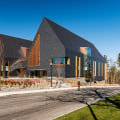When it comes to education, one size does not fit all. Every student has their own unique learning style, strengths, and weaknesses. This is why many parents in southern New Hampshire turn to learning centers to supplement their child's education. But do these learning centers have a specific curriculum or do they tailor it to each student?
The Rise of Learning Centers in Southern New Hampshire
Southern New Hampshire is home to a diverse population, with families from different backgrounds and cultures.This has led to a growing demand for quality education that caters to the individual needs of each student. As a result, learning centers have become increasingly popular in the region. Learning centers offer a variety of programs and services, including tutoring, test preparation, and enrichment classes. They aim to provide personalized instruction and support to help students achieve academic success. But how do they go about creating a curriculum that meets the needs of each student?
The Importance of Individualized Learning
Traditional schools often follow a standardized curriculum that is designed for the average student.This can be challenging for students who learn at a different pace or have different learning styles. As a result, many students may struggle to keep up with their peers or feel disengaged from their education. Learning centers recognize the importance of individualized learning and strive to create a curriculum that caters to the specific needs of each student. This means taking into account their strengths, weaknesses, and learning style.
According to
Education Corner, "Individualized learning is an instructional method that tailors education to the specific needs of each student. This approach allows students to work at their own pace, focus on their interests, and receive personalized support from teachers."By tailoring the curriculum to each student, learning centers can help them reach their full potential and develop a love for learning.The Role of Assessments
In order to create a personalized curriculum, learning centers use various assessments to evaluate a student's academic abilities and identify areas for improvement.These assessments may include standardized tests, diagnostic tests, and teacher evaluations. Based on the results of these assessments, learning centers can determine a student's strengths and weaknesses and develop a curriculum that addresses their specific needs. For example, if a student struggles with math, the learning center may focus on providing additional support and resources in that subject.
According to
Sylvan Learning, "Assessments are an essential part of the learning process. They help identify where students are struggling and where they excel, allowing teachers to tailor instruction to meet their individual needs."The Flexibility of Learning Centers
One of the key advantages of learning centers is their flexibility. Unlike traditional schools, which follow a set schedule and curriculum, learning centers can adapt to the needs of each student.This means that if a student is struggling with a particular concept, the learning center can spend more time on it until they fully understand it. Additionally, learning centers can also adjust the curriculum based on a student's progress. If a student is excelling in a particular subject, they may be given more challenging material to keep them engaged and motivated.
According to
Huntington Learning Center, "Learning centers offer a personalized approach to education, which means that the curriculum can be tailored to meet the specific needs of each student. This flexibility allows students to learn at their own pace and focus on areas where they need the most help."The Benefits of a Tailored Curriculum
There are many benefits to having a tailored curriculum in learning centers. For one, it allows students to learn at their own pace and focus on areas where they need the most help.This can boost their confidence and motivation, leading to better academic performance. Moreover, a tailored curriculum can also help students develop a love for learning. By catering to their interests and learning style, students are more likely to be engaged and enthusiastic about their education.
According to
Kumon, "A tailored curriculum can help students build a strong foundation in their studies, develop critical thinking skills, and foster a love for learning that will last a lifetime."The Importance of Communication
In order for learning centers to create a tailored curriculum, communication between parents, students, and teachers is crucial. Parents play an important role in providing information about their child's strengths, weaknesses, and learning style. This allows the learning center to create a curriculum that meets the needs of the student. Moreover, regular communication between parents and teachers can also help track a student's progress and make any necessary adjustments to the curriculum.According to
Huntington Learning Center, "Communication is key when it comes to creating a tailored curriculum.By working together, parents and teachers can ensure that the curriculum meets the needs of the student and helps them achieve academic success."



